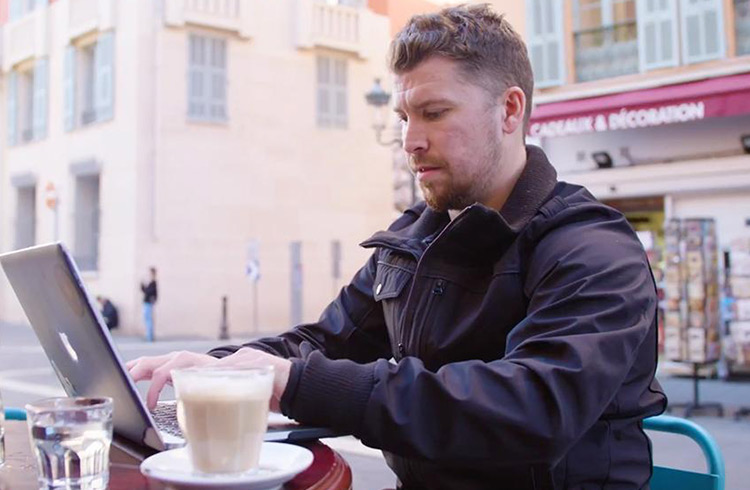Influencers on social media make the digital nomad lifestyle seem idyllic – but what’s it really like to combine work and travel? Freelance journalist Lola shares the pros and cons, and how to find your work/life balance.
 Photo © Getty Images / Westend61
Photo © Getty Images / Westend61
With remote work rising in popularity due to the global pandemic, there’s been an exodus of people leaving their desks behind in favor of making the world their office. Professional digital nomads can be found in all corners of the globe doing their jobs from paradise – or, at least, where there’s a strong WiFi connection. However, working while traveling isn’t as glamorous as social-media influencers would like you to believe.
I’ve been on the road while working as an independent journalist for more than six years. When I started, I had never heard the term digital nomad and had no idea what to expect. I made many mistakes along the way. Here are the true realities of being a digital nomad, to best prepare you for your venture into remote work.
- Pros and cons of being a digital nomad
- Finding your flow
- Proper equipment for digital nomads
- Dispersing your income channels
- Finding your community
- Being nomadic in the COVID-19 era
Pros and cons of being a digital nomad
If you’re motivated to become a digital nomad after seeing photos of people sipping cocktails as they work on their laptops on the beach, you’re in for a reality check. First off, sand and laptops don’t mix. No one works from the beach – they work from a cafe by the beach.
Being a digital nomad is the greatest career decision I’ve ever made. I love having the freedom to choose my hours, the projects I accept, and where in the world I want to be living. As a freelance journalist, I don’t have to adhere to a strict schedule and can work when I want as long as I meet my deadlines. On the other hand, it’s up to me to create a work/life balance and structure my days well so I can achieve my personal and professional goals for the week.
But being a digital nomad isn’t for everyone. Transitioning from a traditional office job that is structured to being your own boss is a process – you have to learn how to manage your time and your workload. Fortunately, your nomadic colleagues will be there to support you and share insight from their journeys into location-independent work.
What I find the most challenging is setting boundaries with my clients and adhering to them. When you live in a vacation destination it can be difficult to take a day off and put up an out-of-office alert as you may have convinced yourself that since you live in the destination, you can enjoy it at any time. Freelancers also need days off, whether it be a mental health reset or time off for a day trip.
Finding your flow
Once you receive the approval to go remote with your employer, or have launched your own remote business, you’ll want to create a schedule that works well for your productivity and lifestyle. Personally, I can’t force creative writing to come. I have to wait until inspiration strikes and I have the energy to put digital pen-to-paper. Because of this, my schedule is dependent on both my mood and my deadlines – every week is different. I’m not a creature of habit, so I thrive on freelance work that varies from one assignment to the next.
If you can set your own hours, work according to your energy levels. If you’re a morning person, work on the more challenging aspects of your job when you're feeling fresh and leave tedious housekeeping tasks to the afternoon when you may have less focus. If you’re not a morning person, sleep in and schedule meetings for the afternoon. In my first few years as a nomad, I only worked at night so that I could spend days enjoying my destination.

Proper equipment for digital nomads
If you’re planning to be someone who doesn’t work from a home base, be prepared to lug along your laptop during your workday to cafes or coworking spaces. Don’t skimp on buying a sturdy backpack that supports both the laptop and your body. If you’re working in a tropical destination, get an anti-humidity laptop case and a laptop stand with a fan to keep your computer cool.
Dispersing your income channels
I’ve met digital nomads from all sorts of industries, from therapists to graphic designers. Many people can do their jobs from anywhere as long as they have their laptops. If you’re not in a full-time, salaried contract role and don’t have a non-compete contract, you may be able to diversify your funds by taking on gigs in multiple fields. Many journalists also take on work writing content for websites or marketing materials for companies. And digital nomads in all types of fields can earn passive money through affiliate marketing by recommending products and services they’ve used and love (including World Nomads travel insurance).
Finding your community
Being nomadic can be lonely and making friends is crucial to your success as a digital nomad. I’ve found the most efficient way for me to be nomadic is to stay in one destination for as long as my visa allows (usually one to six months). Other nomads move frequently and only spend a week or so in a destination. This can make it challenging to form or become part of a community if you’re based in a destination where people tend to pass through quickly. If fleeting friendships exhaust you, hone in on cultivating relationships with locals and long-term expats.
Related articles
Simple and flexible travel insurance
You can buy at home or while traveling, and claim online from anywhere in the world. With 150+ adventure activities covered and 24/7 emergency assistance.
Get a quote


No Comments